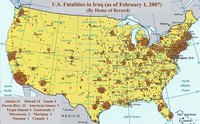March 06, 2007
Open Governance - using the 5th Party to protect the asset
Some many years ago I created a five parties model that used the public as the fifth party to bind all the others together in governing the toughest of assets: money. 5PM is now the benchmark for digital gold issuers, and while not universally adopted, it is widely understood. While I say it myself, I think it a lot more effective, bang for governance buck, than the efforts of the national competitors.
Mostly 5PM is just classical separation of roles (sometimes known as 4 eyes principle), but it also introduced the new factor of open governance: disclosure of key facts to the public, who then audit and share their results over the Internet.
The innovation of open governance creates a dramatic shift in classical governance, as it moves tasks that were previously only possible with (expensive) audits or (backfiring) regulations across to the open market. Solutions then emerge in accord with what stakeholders want to spend, and they emerge in interesting ways.
And, oh so many interesting possibilities! John Quarterman posts:
- Bakersfield pothole map -- Locals report seeing potholes and they get mapped.
- U.S. Fatalities in Iraq -- Someone has taken the home of record for each U.S. fatality in Iraq and mapped it.
- Chicago Crime Map -- This one says down at the bottom: "Important disclaimer: This site is not affiliated with the Chicago Police Department. This site uses crime data obtained from the CPD's Citizen ICAM Web site, which is a publicly available database of reported crime. Please read the Citizen ICAM disclaimer to understand the data fully."
- Bakersfield homicide map -- "This is a map of Homicides in the Bakersfield area that occured in 2006. Locations are approximated and based on data provided by the Office of the Coroner."
In every one of those, people have identified an asset, and have created an open participatory forum for sharing information about it. Why? To protect the asset, of course.

This is a darn sight less expensive than classical forms of governance (regulations, external auditing, but also see how the above list directly challenges representational democracy and internal auditing). As those efforts move steadily, deeper into stormy weather, we can expect open governance to become more and more important in securing assets. Mark the rising star as one to watch.
Posted by iang at March 6, 2007 05:13 PM | TrackBackDisclosure, Discovery, Access, and Transparency are the keys to an informed franchised public that finds its self interest in the maintenance of a system. To put it simply the users if they are allowed participate in the support will provide eyes and ears that management simply has to listen to. The flaw in most systems is the uneven playing field that attempts to discredit the non-expert typically the users and force feed them the tripe cooked up by the experts. Microsoft is one such system in the operating system world. As if they where kings appointed by God to their position they dictated standards and slowly over time, whatever advantage and power they had, has slipped into oblivion. The US on a geo-politcal scale has suffered from the same problem rather than provide a system of equally vested participates the foreign policy of the US has been over the years drifting into extreme points of view regarding its interest. The underlying premise is based upon “ them versus us” mentality with hostility as the control element in the relationship. The need for hostility to enforce the relationship with the users or beneficiaries in the end kills the desire for the system to be used.
So what we are faced with is a culture and society run by two societies and cultures one simply oppresses the other to achieve its status. The appearance of value being transferred is all the oppressive class has to achieve, something like placing in god we trust on the currency or suggesting in tricky language that the value is really gold when in fact it isn’t/
I don't know how much good the public can do against a government stealing the assets.
"Wherever there's a large corpus of wealth, if at all possible it WILL be plundered." - unknown